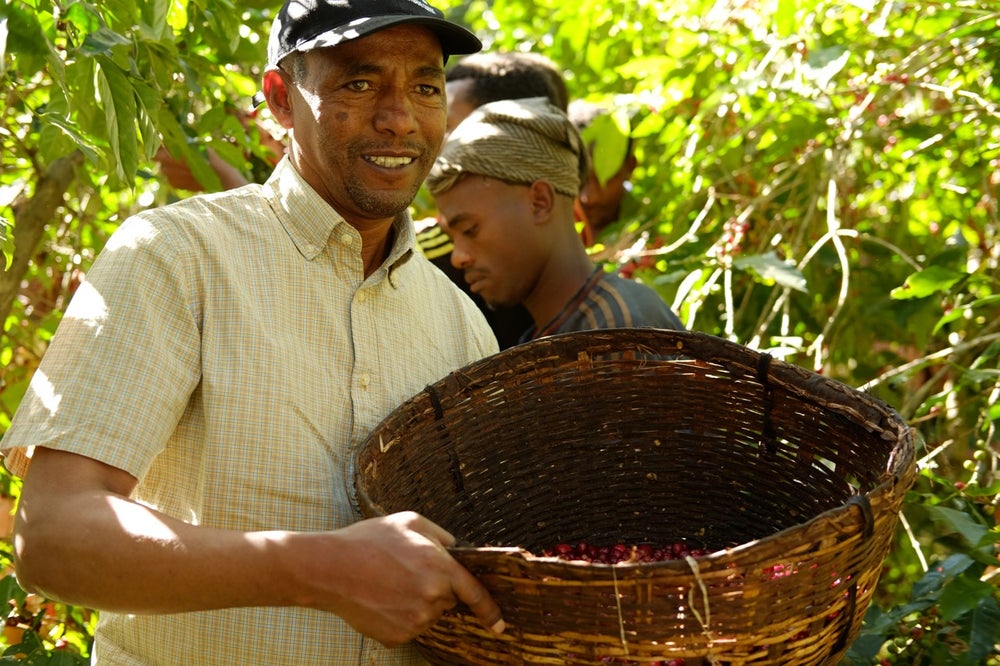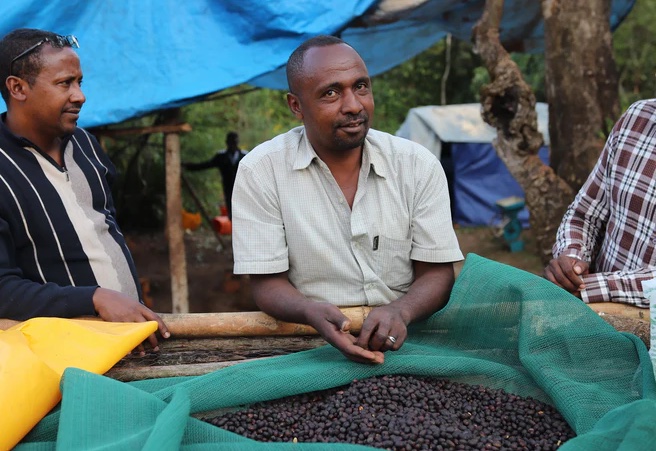Tesfaye Bekele is a well-known coffee farmer from Ethiopia, particularly recognized for his contributions to the coffee industry in the Guji region. He established his Suke Quto farm in 2000 after large forest fires, as he wanted to protect the forest through his activities. He planted indigenous trees and coffee trees to restore the land. His efforts have transformed the landscape and improved the local ecosystem. This also achieved Tesfaye’s other goal: environmentally friendly coffee that supports the local people both financially and communally.
Tesfaye is committed to sustainable agricultural practices. He uses methods that maintain soil health, conserve water, and reduce the need for chemical inputs. His approach often includes organic farming techniques. Tesfaye grows coffee in the shade, which means cultivating coffee plants under the canopy of native trees. This method supports biodiversity, helps in pest control, and improves the quality of the coffee beans by allowing them to mature more slowly. In 2009, Tesfaye began exporting coffee under his own export business named Tade GG.
His work is highly valued for both the quality of the coffee, his innovative farming practices, and his community projects. Tesfaye works closely with local communities, providing education and support to other farmers. He promotes fair labor practices and aims to improve the livelihoods of those involved in coffee production. Together with Trabocca, a coffee importer, Tesfaye started the Suke Quto School Project in 2015, aiming to build fully equipped schools for the children of the Kurume and Suke villages.
Suke Quto
Origin: Guji, Ethiopia
Producer: Tesfaye Bekele
Certificates: Organic, Rainforest Alliance
Processing: Washed, Natural, Pulped Natural
Varieties: Kurume, Welicho
Altitude: 1800-2200 masl
“I come from a coffee-producing family, so during my childhood, I started to work with coffee early on”, Tesfaye continues, “At first, coffee did not have my interest. The labor was hard, and the days were long. But after several years of study and other work I returned to my home in the Shakisso woreda, Guji. I found myself in coffee again.”

Image: Sucafina
Guji coffee has only recently been distinguished from the coffees coming from the neighboring areas of Sidama and Yirgacheffe. However, their excellent quality and unique profiles are quickly gaining international recognition.
Most of Ethiopia’s producers are small-scale farmers, and the majority still cultivate coffee using traditional methods. As a result, most of the coffee is grown without chemical fertilizers or pesticides. The coffee is cultivated, harvested, and dried almost entirely by hand.
Tesfaye Bekele’s coffees featured in the SLURP coffee experience
References:
Ethiopia Suke Quoto Farm, Trabocca
Ethiopia Tade GG Natural, Sucafina
Comments (0)
Leave a reply
You must be logged in to post a comment.




